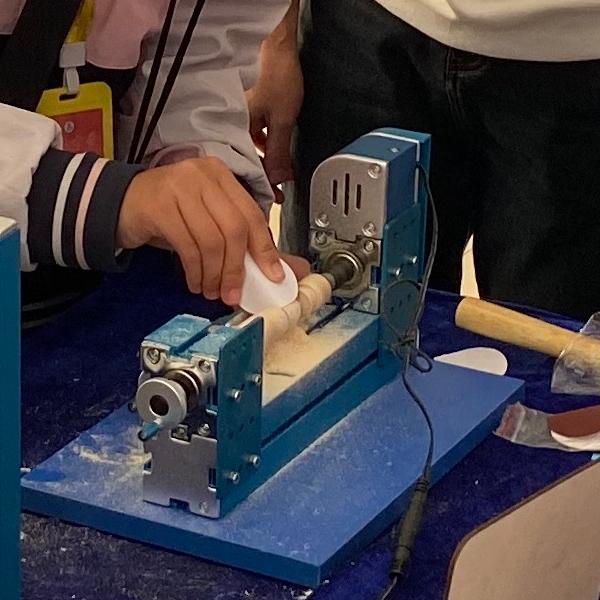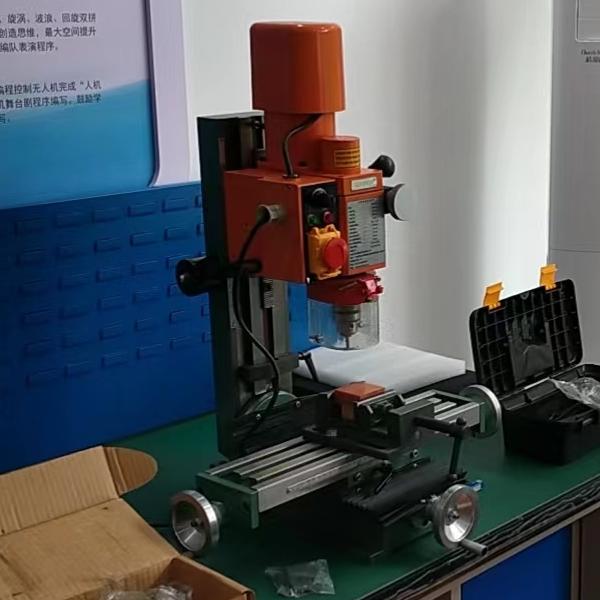Blog
Xendoll has 22 years of experience in the production of small machine tools. We will help you choose the suitable machine and share our experience in CNC machining with you.
 Apr 25, 2025
Apr 25, 2025
 Xendoll
Xendoll
 1152
1152
In the rapidly evolving world of STEM (Science, Technology, Engineering, and Mathematics) education, hands-on learning tools like metal lathes are becoming indispensable. For beginners—whether students, hobbyists, or educators—choosing the right equipment can be daunting. A mini lathe offers the perfect balance of functionality, safety, and affordability, making it ideal for educational environments and first-time users.
STEM education thrives on practical, project-based learning. A mini lathe bridges the gap between theoretical knowledge and real-world application by allowing users to design, prototype, and fabricate metal components. Here’s why it’s a game-changer:
①Affordability & Accessibility
Traditional industrial-grade metal lathes are expensive and bulky, making them impractical for schools or hobbyists. Mini lathes, however, are compact, cost-effective, and designed with beginners in mind. This accessibility democratizes engineering education, enabling institutions with limited budgets to equip labs effectively.
②Skill Development
Operating a mini lathe teaches foundational skills like precision measurement, material properties, and machining techniques. These competencies align with STEM curricula, preparing students for careers in engineering, manufacturing, and robotics.

③Safety & Ease of Use
Mini lathes prioritize user safety with features like emergency stop buttons, enclosed gears, and reduced operational noise. Their simplified controls allow beginners to focus on learning without intimidation.
④Versatility in Projects
From crafting simple bolts to intricate mechanical parts, a metal lathe empowers users to tackle diverse projects. This versatility keeps learners engaged and encourages problem-solving—an essential STEM skill.
Not all mini lathes are created equal. Here are the critical factors to consider when selecting the best metal lathe for STEM education or personal use:
A compact design (e.g., 7" x 12" workspace) ensures the lathe fits in small classrooms or home workshops. Look for lightweight models with easy storage options.
A 350W–500W motor provides sufficient torque for soft metals like aluminum or brass, while variable speed settings (0–2500 RPM) allow customization for different materials and projects.
Features like digital readouts, micrometer adjustments, and rigid construction minimize errors—a must for teaching precise engineering principles.
Emergency stops, protective shields, and thermal overload protection reduce risks, especially in group learning environments.
Opt for brands that offer tutorials, project guides, or lesson plans. For example, Xendoll’s mini lathes include STEM-focused project kits tailored for classrooms.
Stainless steel components and easy-to-clean designs ensure longevity, even with frequent use.

At xendolltools.com, we specialize in mini lathes designed for beginners and educators. Our Metal Lathe stands out as a top choice for STEM programs, thanks to its:
User-Friendly Interface: Intuitive controls and labeled dials simplify operation.
Educational Bundles: Includes project blueprints and safety guides for teachers.
Expandability: Compatible with attachments like milling machines for advanced projects.
Educators at Oakridge STEM Academy reported a 40% increase in student engagement after integrating our lathes into their curriculum, with projects ranging from robotics parts to renewable energy prototypes.
①Start with Basics
Teach foundational skills like tool alignment, speed adjustment, and material clamping.
②Project-Based Learning
Assign challenges like creating gears for a wind turbine or custom brackets for a robot.
③Collaborative Work
Encourage teamwork by dividing tasks—design, machining, and quality control—among students.
Choosing the best metal lathe for a beginner isn’t just about the machine—it’s about fostering a lifelong passion for STEM. A mini lathe combines affordability, safety, and educational value, making it an ideal tool for schools, hobbyists, and aspiring engineers. By investing in a quality lathe like Xendoll’s, educators empower learners to turn theoretical concepts into tangible innovations.
Ready to equip your classroom or workshop? Explore our range of STEM-focused mini lathes at xendolltools.com and unlock the potential of hands-on learning today!
For details, please refer to the following link:
https://www.xendolltools.com/category/micro-cnc-machine.html



 Show all our samples
Show all our samples
 Provide you with a free quote
Provide you with a free quote
 Answer all the questions you may have
Answer all the questions you may have
 Guided installation and other options
Guided installation and other options